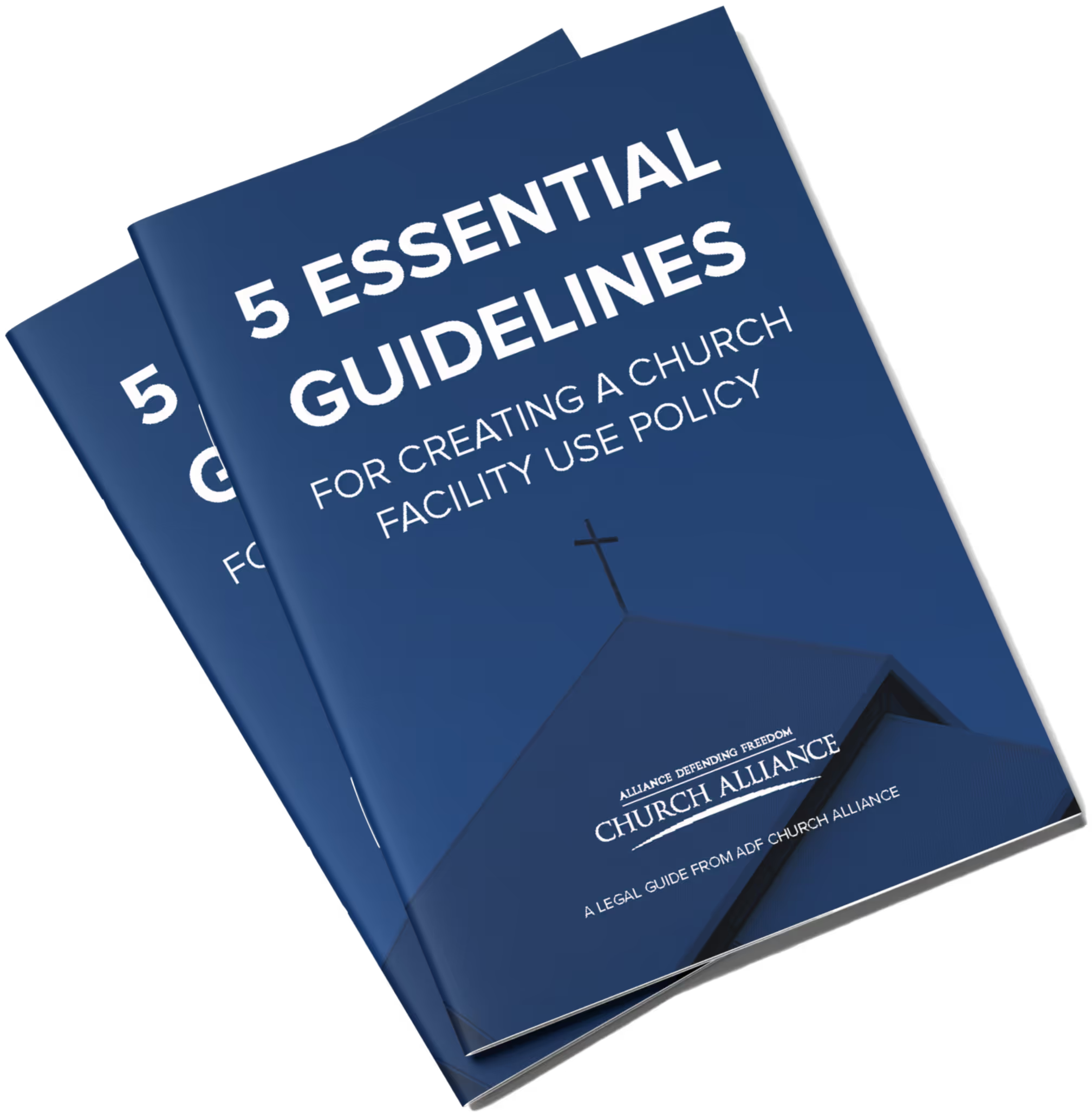
The church stands as a vibrant testament to God’s call, tasked with serving people, spreading the Gospel, and carrying out the Great Commission. This mission is a significant undertaking, especially in a world that so often trades truth for lies. In the face of darkness, the church is called to shine even more brightly and stand as a “pillar and foundation of the truth” (1 Timothy 3:15).
Legal Issues Churches Are Facing & How We Can Help
Today’s cultural landscape presents churches with many unique legal challenges. Churches are having to answer questions like:
Church leaders often express uncertainty when navigating these challenges, seeking guidance on how to respond legally while remaining rooted in biblical truth and love. The ADF Church & Ministry Alliance program is here to equip your church to navigate these questions and safeguard your religious liberty.
Your church’s bylaws, constitution, and other policies should do more than meet legal requirements—they should reflect and reinforce your church’s identity. When thoughtfully crafted, these documents articulate your church’s mission, guide daily operations, and ensure your biblical beliefs are woven throughout every aspect of your ministry. Too often, churches treat these documents as routine paperwork, missing the opportunity to make them an expression of their faith. But when your documents clearly state what your church believes and how those beliefs shape its ministry, they provide a stronger foundation for your religious liberty.
How CMA Can Help:
Through our Religious Liberty Assessment, churches can submit their governing documents for legal review. Our attorneys analyze these materials to ensure they align with your church’s deeply held beliefs and provide expert recommendations for strengthening the legal foundation of your church’s religious liberty.
Hiring staff who share your church’s faith and values is vital to fulfilling your mission. Your team isn’t just filling roles—they’re actively shaping the spiritual life of your church.
Churches have First Amendment and statutory rights to make employment decisions based on their religious beliefs. Churches should develop religious employment practices consistent with those rights. A well-defined Christian philosophy of employment, supported by carefully crafted job descriptions and policies, provides a strong legal and theological foundation—allowing your church to remain faithful in both its calling and its operations.
How CMA Can Help:
We provide guidance on structuring employment documents, handbooks, and job descriptions to reflect your church’s mission and protect its legal right to make employment decisions based on religious beliefs.
Case Study: Sacred Heart of Jesus Parish
Michigan's reinterpretation of its non-discrimination laws threatens to force Sacred Heart Academy to hire faculty and staff who lead lives in direct opposition to the Catholic faith, speak messages that violate Church doctrine, and refrain from articulating Catholic beliefs in teaching its students. We’re defending the ministry’s right to operate in accordance with its religious beliefs.
Some states are using health insurance mandates to force churches to cover abortions, gender-transition procedures, and other services that violate biblical convictions. Without careful planning, churches may unknowingly provide coverage that conflicts with their beliefs.
How CMA Can Help:
We can help you determine if your health insurance plans cover procedures or medications that conflict with your biblical convictions and, if necessary, potentially pursue legal relief.
Case Study: Cedar Park Assembly of God of Kirkland
A Washington state law forces churches and ministries to cover elective abortions in their health insurance plans. As a result of the state’s mandate, Cedar Park Church’s insurance carrier inserted abortion coverage, including surgical abortion coverage, directly into the church’s health plan, even though this goes directly against the church’s beliefs. With the help of Alliance Defending Freedom, Cedar Park is standing up in the courtroom for its belief in the sanctity of life.
Churches are sometimes excluded from public benefit programs simply because they are religious, or because participation requires compromising their religious beliefs. However, this could violate a church’s constitutional rights.
How CMA Can Help:
We provide guidance to help your church evaluate and navigate access to public benefits, ensuring that its religious freedom is protected in the process.
Case Study: Bethel ministries
Maryland officials revoked a church-run school’s eligibility to participate in a voucher program to benefit low-income students and demanded the school pay back thousands of dollars for previous participation in the program. Although the school fully complied with the program’s requirements, state officials disqualified Bethel from participating in the program after reading Bethel’s Christian beliefs about marriage and sexuality.
Churches have the freedom to use their buildings in ways that reflect their faith, but allowing outside groups to use their spaces requires careful stewardship. How do they ensure facility use remains aligned with their beliefs? Without a clear facility use policy, churches may struggle to maintain consistency between their religious beliefs and the use of their property.
A well-crafted policy articulates the religious nature of your church building and sets boundaries for appropriate use. Without it, your church risks confusion, disputes, or even legal challenges when facility use conflicts with its beliefs.
How CMA Can Help:
We can assist you in creating a facility use policy that stewards your property consistent with your religious mission and beliefs.
5 Essential Guidelines for Creating a Church Facility Use Policy
As detailed above, your church facilities play a vital role in advancing your ministry, but their use also comes with important legal considerations. Our guide outlines practical steps to help your church:

The Church & Ministry Alliance program offers a range of benefits to help protect your church's religious liberty and strengthen its mission:

CMA members receive access to experienced attorneys who are available to answer legal questions and provide guidance on critical issues impacting your church's religious liberty. Additionally, members benefit from the Religious Liberty Assessment (RLA), a comprehensive review that identifies potential legal vulnerabilities and provides recommendations to strengthen your church's legal foundation.

Access educational resources focused on legal and cultural matters impacting churches and other ministries, including livestreams with attorneys, practical legal guides, on-demand videos, and Christian worldview resources.

Receive curated updates and insights to help you navigate complex legal and cultural issues that impact your ability to operate consistent with your religious beliefs.

Join a community of like-minded Christian church leaders who are advocating for religious freedom and shaping the culture by living out the truths of the Gospel.

Equip your staff with training and resources designed to address today’s legal challenges encountered while living out and faithfully teaching a Biblical worldview.
* Our team is in the planning or early stage of offering these services.
The Religious Liberty Assessment is a members-only tool designed to help churches identify legal vulnerabilities and opportunities to strengthen their religious liberty, setting the stage for ongoing legal support and consultation. This assessment provides an opportunity to examine key areas of your church’s operations, starting with its governing documents, in light of its religious liberty so you can proactively safeguard your mission.
Become a member and gain access to our exclusive Religious Liberty Assessment along with other valuable benefits to support your church’s mission.
Fill out the online questionnaire to provide us with insights into your church’s legal standing. Upload the necessary documents (Bylaws, Articles of Incorporation, Constitution, Statement of Faith, and Additional Doctrinal Statements) to help us understand your current practices and the language used to describe your ministry.
An experienced attorney will review your submission, provide personalized feedback, and schedule a meeting to discuss your results and next steps for building the legal foundation of your church’s religious liberty.
When you join the ADF Church & Ministry Alliance, you’re not alone. You’re part of a growing alliance of schools, churches, and ministries boldly living out their missions and transforming culture with the truth.




The ADF Church & Ministry Alliance program offers tiered pricing to ensure that every church—large or small—can join the alliance.
$250
$500
$1,000
$2,000
$4,000
The CMA program addresses a wide range of religious liberty issues, including employment practices, facility usage, membership agreements, and more. Our Scope of Services document provides additional details here.
Membership fees are based on your church’s congregation size. See our pricing section above for details.
Absolutely. The CMA program is designed to support churches of all sizes, ensuring you have the resources you need to navigate religious liberty-related legal challenges.
Yes. ADF Church & Ministry Alliance members must agree with our statement of faith, which consists of the Apostle’s Creed and a set of ADF Doctrinal Distinctives. While the alliance includes churches from a variety of denominations, all members hold to these same core biblical truths.
This statement is essential for all churches to review and affirm before becoming members. Click here to read the statement.
No. The ADF Church & Ministry Alliance is not an insurance program, and Alliance Defending Freedom is not an insurance company. ADF may represent ADF Church & Ministry Alliance members in pro-bono, limited scope representations upon request or in litigation related to protecting the religious liberty of the church or ministry. However, ADF cannot guarantee legal representation in every situation and does not provide casualty payments for a lawsuit. Any legal representation undertaken by ADF is without cost to ADF Church & Ministry Alliance members.
Yes, upon submission of your membership application, please check your email for a notice from our team that will include a link to provide more details related to your request for legal help.
Please understand that signing up for an ADF Church & Ministry Alliance membership doesn’t guarantee legal representation. ADF may review your situation to determine if ADF can assist you with the current issue, but signing up for membership is not the same as retaining an attorney for legal services. ADF has the sole authority to determine if ADF can assist an organization with requests for advice or representation.
Contact us by calling 1-833-233-2559 or emailing [email protected].
